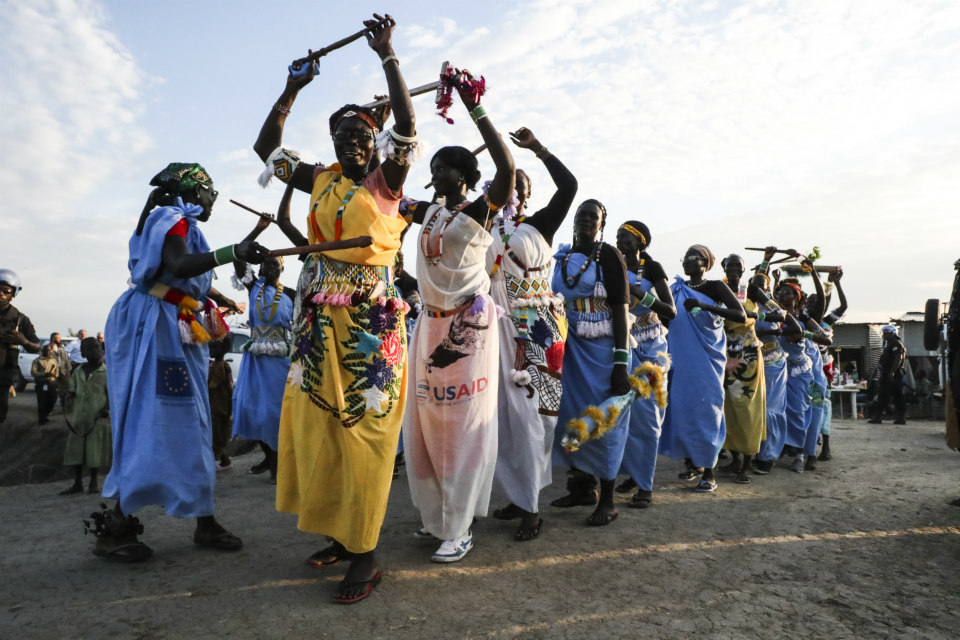"The challenge is to talk about women and peace and security when our agenda is Syria, or Somalia, or South Sudan"
Statement by Ambassador Matthew Rycroft, UK Permanent Representative to the United Nations, at the Security Council Open Debate on Women, Peace and Security.

Thank you Mr President, thank you to all of our briefers, and to our visiting ministers, for their remarks. I鈥檓 particularly grateful that we had the opportunity to hear a civil society voice in this Chamber today. That鈥檚 even more vital at a time when so many such voices are being ignored, threatened or silenced around the world. So that鈥檚 great and it鈥檚 also great that we have so many people attending this debate with us today.
But in the spirit of trying to improve still further how we do things here, let me make a few points frankly. We meet in this format once a year and we repeat what we already know: that we need more women at the negotiating table, that peace deals stand a greater chance of succeeding with women taking part, that we need to turn our words into action.
And yet, year after year, session after session, SG report after SG report, the actual implementation of this agenda still falls way too short. We鈥檝e had resolution after resolution 鈥� eight of them since resolution 1325 鈥� and yet the promise of that first historic text still remains unfulfilled.
So I encourage everyone intervening later today to be specific. Specific about what our country is doing since we last met in this format to make the Women, Peace and Security agenda a reality, and then, ideally, to commit to do even more.
This year, the UK has worked to increase women鈥檚 participation in conflict resolution in some of the most fragile countries in the world: in Somalia, in Syria, in Yemen, in Afghanistan. We鈥檝e helped women in parliament, in civil society, in the military and in business, to increase their voice, their influence, their participation, and we will keep doing so next year.
But we also know that women, peace and security is about more than work in individual countries. So many of the dangers that women face in conflict are shared dangers, found in every conflict. Dangers like sexual violence. Like stigma against survivors of these horrific crimes. And since these are shared challenges, we must all share in the response if we are to affect international change.
And that鈥檚 why the UK has been a champion of preventing sexual violence in conflict. It鈥檚 why we launched the global principles on stigma at UNGA this year. It鈥檚 why we鈥檙e running 23 projects in conflict and post-conflict countries to support survivors, end stigma, and deliver justice. And it鈥檚 why we鈥檝e contributed $2 million to the Women鈥檚 Peace and Humanitarian Fund, and I urge others to contribute, too.
Turning to the peacekeeping, this year UK troops on large-scale overseas missions 鈥� whether for the UN or anyone else 鈥� now receive pre-deployment training on preventing sexual violence, and on the Women, Peace and Security agenda more broadly. And we鈥檒l be launching, alongside our Bangladeshi and Canadian partners, a new global network of military gender champions at the peacekeeping ministerial conference in Vancouver next month.
We strongly support the Secretary-General鈥檚 commitment to gender parity and his efforts to increase the number of women in peacekeeping. However, the Women, Peace and Security agenda is far more than numbers, and we鈥檙e concerned, frankly, that the UN Secretariat are de-prioritising gender advisors in UN missions, and we urge the UN to reinstate accountability through its compacts with UN leaders.
Mr President, in the UK this year, Baroness Hale became the first woman ever to head our supreme court, which makes it the first time in our history that we鈥檝e had women as our head of state, our head of government, and head of the most senior court in the land. We also this year appointed our first ever Special Envoy for Gender Equality, putting gender equality at the heart of our foreign policy.
But despite these historic steps, we have more to do. So that鈥檚 why, next year, we鈥檒l be launching the UK鈥檚 fourth National Action Plan, building on progress made, lessons learned, and our discussions with civil society and focus countries.
And my final point, Mr President, is that there is more that we can all do, each of us around this table, both internally in the missions or ministries that we lead, and externally in the Security Council and around the United Nations. Internally, I commend to you the UK Mission鈥檚 Gender Compact that I launched this year. I encourage you to read it, to steal its good ideas, and apply them in your own missions. And outside our missions, we must practise what we preach in this Security Council every day.
It鈥檚 easy to talk about women, peace and security when that is the subject on our agenda, like it is today, but the challenge is to talk about women and peace and security when our agenda is Syria, or Somalia, or South Sudan. We could all do better on that, and I encourage everyone to come together to do so.
Thank you.